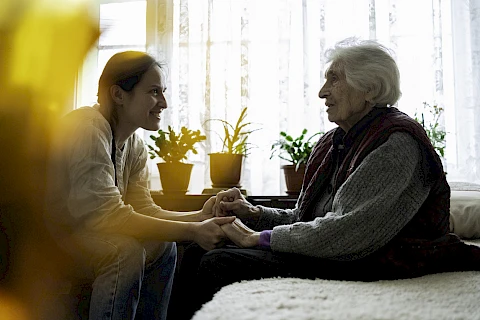
Parkinson's disease is a complex neurological condition that affects every aspect of a senior's life, including their emotional well-being. Navigating the emotional landscape of Parkinson's can be challenging both for seniors and for the people who care about them. This makes understanding the emotional impact of Parkinson's as important as managing its physical symptoms. This Senior Helpers blog post sheds light on the emotional toll of Parkinson's disease and offers useful strategies for managing these feelings.
Emotional Impact of Parkinson's
Parkinson's disease entails more than just physical symptoms like tremors and muscle rigidity. There are often significant emotional effects too. Seniors might experience a range of emotional responses, from depression and anxiety to fear and frustration. This wide spectrum of emotions can significantly impact their quality of life and their ability to maintain relationships, hobbies, and activities they enjoy. Depression and anxiety are two of the most common emotional responses to Parkinson's. The fear of the unknown, coupled with the strain of managing daily tasks, can contribute to a sense of dread or unease. The family too can feel the emotional burden as they grapple with feelings of sadness and helplessness while trying to provide the best care possible.
The Role of Emotional Support in Parkinson's Care
During this emotionally challenging journey, the role of emotional support cannot be overstated. Having a support system of caregivers, family, and friends can make a significant difference in the lives of those with Parkinson's. This emotional support can take various forms, including encouraging words, assistance with daily tasks, companionship, or simply being there to lend an understanding ear.
Strategies for Managing Emotional Responses to Parkinson's
Managing emotional responses to Parkinson's requires patience and compassion. Here are some things to consider:
Acknowledgment
Acknowledging that it is normal to have these emotions and understanding that there are ways to manage them can be incredibly empowering. Maintaining a hopeful attitude and focusing on the things you can control can help ease the way.
Communication
Seniors with Parkinson's need to be honest and open about what they are going through. Avoid isolating yourself and talk to loved ones about your feelings. Consider joining a Parkinson's support group where you can share your experiences with others on a similar journey.
Professional Help
Seeking professional help can make a significant difference. Mental health professionals can provide techniques and strategies to cope with anxiety and depression. They can also offer guidance on maintaining emotional well-being amidst the demands of managing a chronic disease.
Senior Helpers Offers Compassionate Parkinson's Care
At Senior Helpers Winston Salem Greensboro, we understand the power of emotional support. Our signature Parkinson's Care Program is a respected, first-of-its-kind program designed specifically for in-home senior care. Our caregivers are expertly trained to recognize signs of depression and anxiety and can guide and assist seniors and their families with a personalized care plan. We strive to foster an environment of empathy, understanding, and respect to help our seniors deal more effectively with their emotional challenges.
We Are Here To Help
Senior Helpers provides comprehensive, in-home senior care services customized to meet the individual needs of seniors in our communities. If you live in the Kernersville, Greensboro, Reidsville, or Guilford County areas, contact us anytime at Senior Helpers Winston Salem Greensboro. We firmly believe in the importance of holistic care that addresses not just the physical but also the emotional ups and downs of living with Parkinson's.